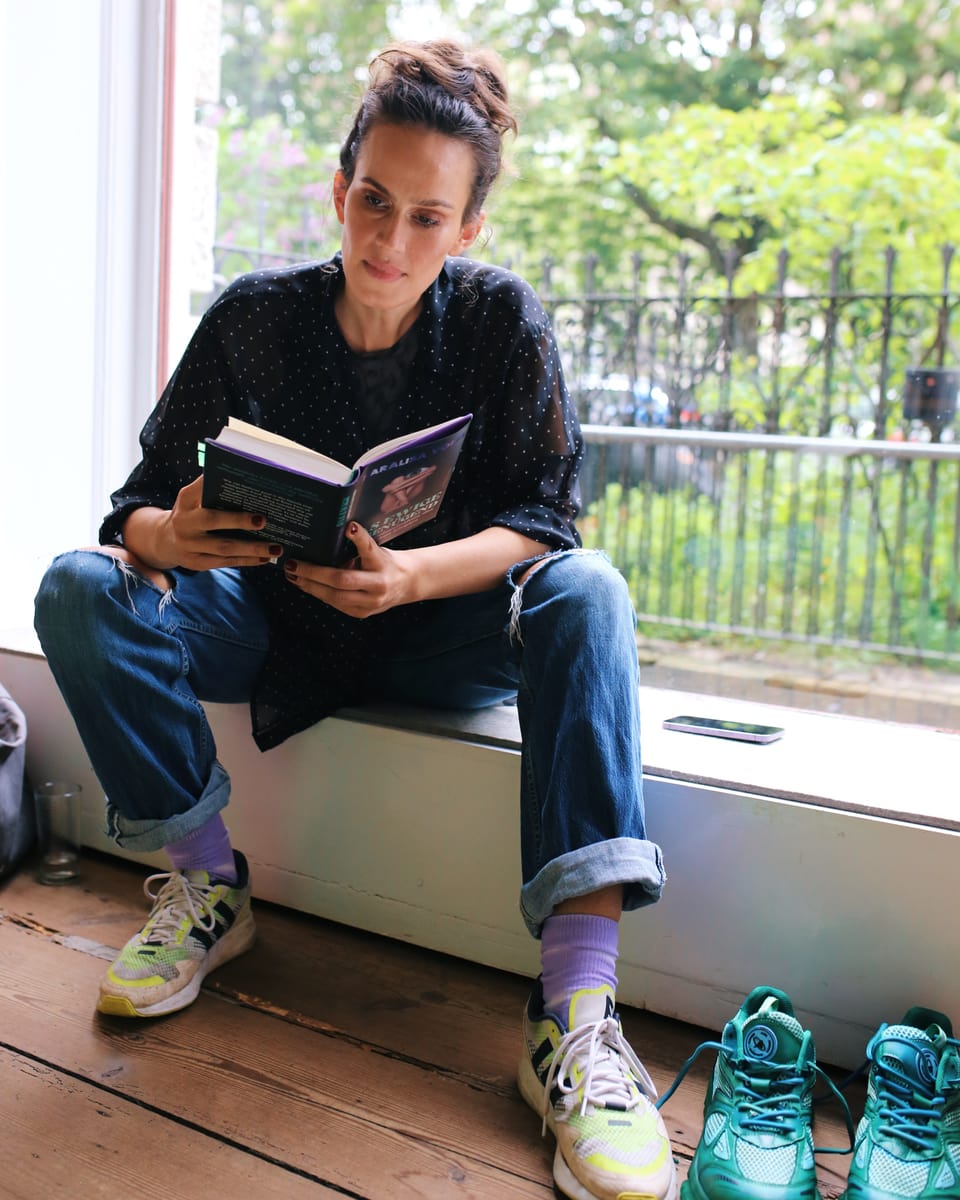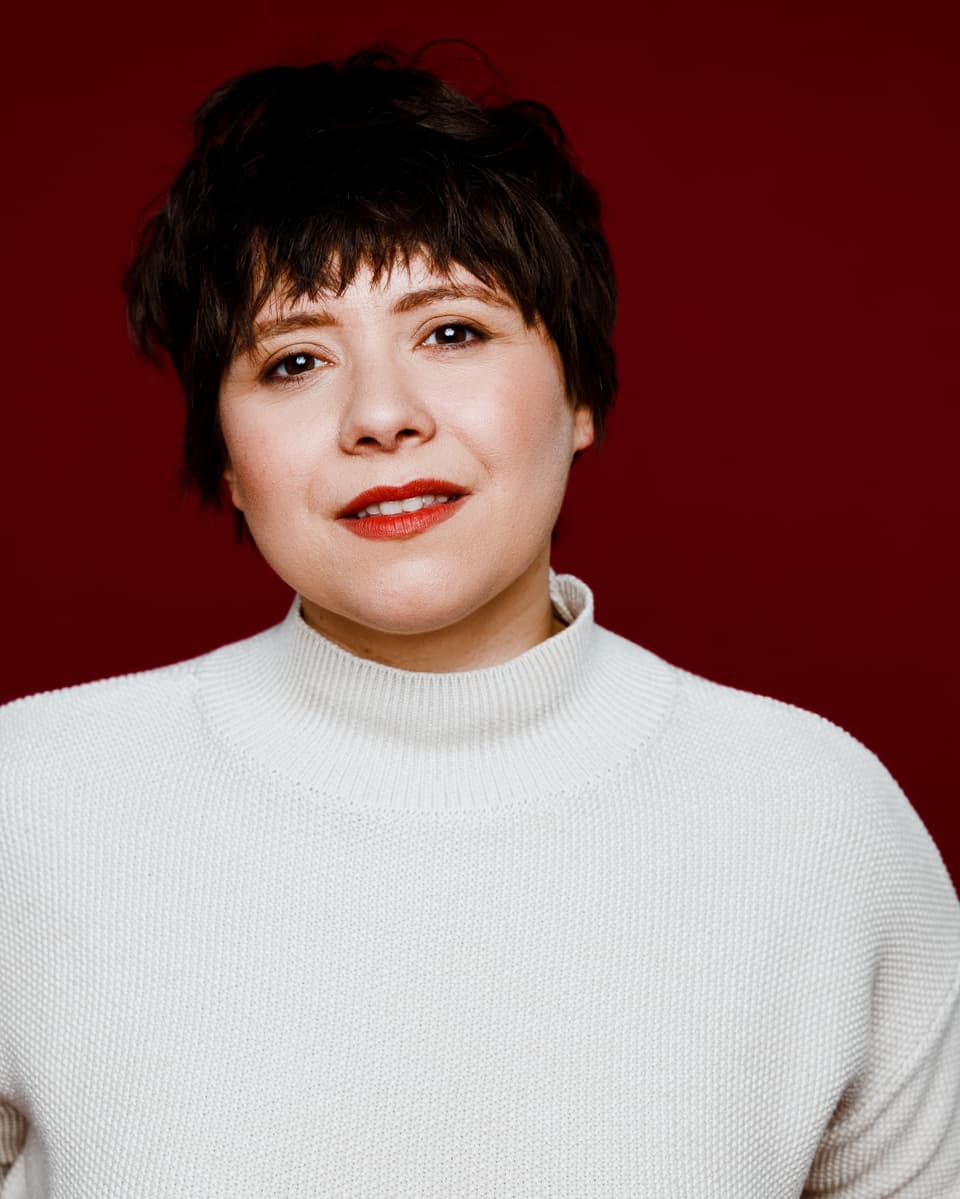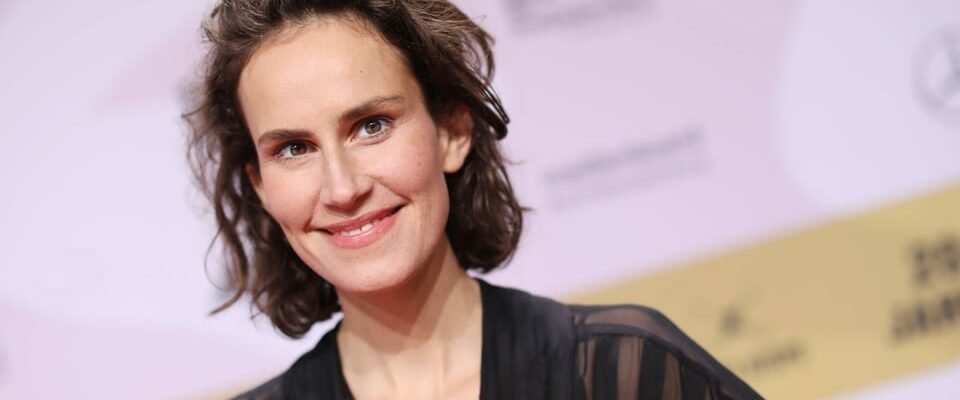For a long time, Saralisa Volm wanted to get rid of her body. He bothers her. Because he’s never good enough. When she was seven, she compared how wide her thighs were with other girls. And even though she was so thin back then that her parents stuffed her with cocoa and sweet breakfast pops, she was convinced that her legs were too fat.
“I haven’t felt comfortable in my body since I was in elementary school,” Volm says today. She has struggled with her body for years – this is what the actress, filmmaker and curator describes in her autobiographical non-fiction book “The Eternal Insufficient. “An inventory of the female body.”
Legend:
Being in the spotlight and being judged for her looks: Saralisa Volm knows this all too well because of her job.
IMAGO / Event Press
As bad as alcohol addiction
Saralisa Volm also writes frankly about the eating disorder that she developed when she was 15: bulimia. She eats and then vomits again. She suffered from the disease for eight years, sometimes more, sometimes less. “I kept slipping into it – it was like an alcohol addiction,” says Volm looking back. She stops two treatments. She tries to cope with the illness on her own.
She can’t make the jump because the illness is damaging her health. But because bulimia is starting to affect her appearance: “I’ve gotten fatter. When you vomit regularly, your body tries to bind all the nutrients. I was also afraid that my hair and teeth would break.”

Legend:
After Saralisa Volm gave birth to four children, her body changed – something she still struggles with today.
Saralisa Volm
Today Saralisa Volm is 38. She lives in Berlin and is the mother of four children. The relationship with her body has remained difficult. Now she no longer likes the parts of her body that she used to find okay at least sometimes. Her breasts sag, you can see spider veins on her legs and the first wrinkles on her face. This is how Volm sees himself.
To others, however, she looks like a model: long legs, slim figure, even face. «I think women often perceive their bodies to be completely different than they actually are. Most of the time they see each other in comparison. And in comparison, the body is never good enough.”
Well-documented self-hatred
The fact is: many women despise their bodies. This is also confirmed by the Austrian cultural scientist Elisabeth Lechner. She has dealt intensively with social ideals of beauty and body images: “This self-hatred in women is very well documented. Many women have an absolutely objectified, distorted self-image: They see their bodies as if through a grid and only notice supposed ‘problem areas’.”

Legend:
Elisabeth Lechner published the book “Riot, don’t diet!” in 2021. written. The thesis: Beauty is not just a business, it is above all one thing: political.
Elisabeth Lechner
For these women, their body is not the medium through which one can feel the sun on their skin and experience sexuality. “But they just think about it: ‘What does that look like?’,” explains Lechner.
Devaluing your own and other bodies
This pressure to be beautiful also affects more and more men. But with women it is even more blatant. Because women’s bodies are constantly evaluated – from childhood onwards. Women and girls have internalized this so much that they often devalue other women themselves, says Saralisa Volm: “It’s crazy how normal it is to talk disparagingly about other bodies: ‘What kind of dress is she wearing? Doesn’t she have any friends who tell her she can’t walk around like that?”
Social media has increased the pressure on women to be beautiful: “We are flooded all day with images that look better than you do,” says Saralisa Volm. “This comparison is omnipresent.”
Political dimension of self-hatred
In her book, Volm makes it clear who benefits from this: including the cosmetics and beauty industry. She makes billions with women’s “self-optimization.” “The beauty industry deliberately shames new areas of the body in order to sell even more products,” explains cultural scientist Elisabeth Lechner.
Women’s self-loathing is closely intertwined with our capitalist consumer world. The fact that women often feel so inadequate also has a political dimension – and this is far too often overlooked, says Saralisa Volm: Anyone who has low self-esteem automatically reduces their demands – towards their partner, towards society and towards their employer.
“If I don’t feel like I have the right to equal pay – because I’m not enough – then I probably won’t demand it. So many in our society benefit from the fact that women feel like they have to do more. In this sense, it is incredibly ‘practical’ that women despise themselves so much,” says Volm.
Why body positivity alone doesn’t help
Young, white, thin – this is what the omnipresent “ideal image” of a body looks like in our society. Those who do not conform to these ideas suffer even more from the “pressure to be beautiful”: black people and people of color, people with physical disabilities, fat and older people, people from the queer community. They are all disadvantaged in different ways in our society, which is dominated by appearances.
In recent years there has been increasing protest against such a standardized image of beauty. The body positivity movement, for example, states: All bodies are beautiful and good just the way they are. This message has long since reached fashion and cosmetics companies.
They have adapted their advertising campaigns accordingly: larger women, who are sometimes non-white, are now smiling on billboards. However, they also usually have a flat stomach, no trace of cellulite and perfectly hairless legs. Saralisa Volm sees this critically: “This is just to sell me something.”
Many activists see it the same way as Volm. That’s why there is now another movement: the so-called body neutrality. The idea behind it: to focus more on being together and less on appearance. Or as Saralisa Volm puts it: “Just let the body be the body.”
Photos with unshaven legs
Of course, it’s not that easy. But Volm has a few ideas: For example, you should be conscious about who you follow on social media. Do the pictures of perfect-looking influencers just put you down? Then get rid of it, says Volm. Advertising can also be hidden automatically. Her tip: “Look at more art. There are fantastic profiles that show different bodies – that don’t correspond to the norm.”
Such a profile is her own: Saralisa Volm started one in 2019 Instagram account on which she showed herself with supposed flaws for a year. There you can see her with unshaven legs and a bright red head after exercise – all counter images to the perfectly staged photos that you usually see on social media.
In order for our society to evaluate bodies more neutrally in the long term, we have to start with children, says Volm: “Many of us clearly grew up with body shaming. Parents or grandparents judge whether you are too fat or too thin, too tall or too short. Whether it’s better to wear this or that.”
From self-hatred to system anger
However, these tips are of little help if you have a body that is discriminated against in some way – for example because you have a physical impairment or are non-white. Then you can still love your own body or evaluate it neutrally. Society shows you very clearly: It doesn’t matter what you look like.
Cultural scientist Elisabeth Lechner therefore demands “that we transform self-hatred into system anger.” For example, by boycotting senseless inventions from the beauty industry or organizing protests. “There are no limits to the resistant imagination,” she says.
Saralisa Volm has now developed strategies to cope better with her own body: she no longer stands on the scales and no longer spends so much time in front of the mirror. «I try to tell myself more often that some things don’t matter. I try to distract myself from my body.”
